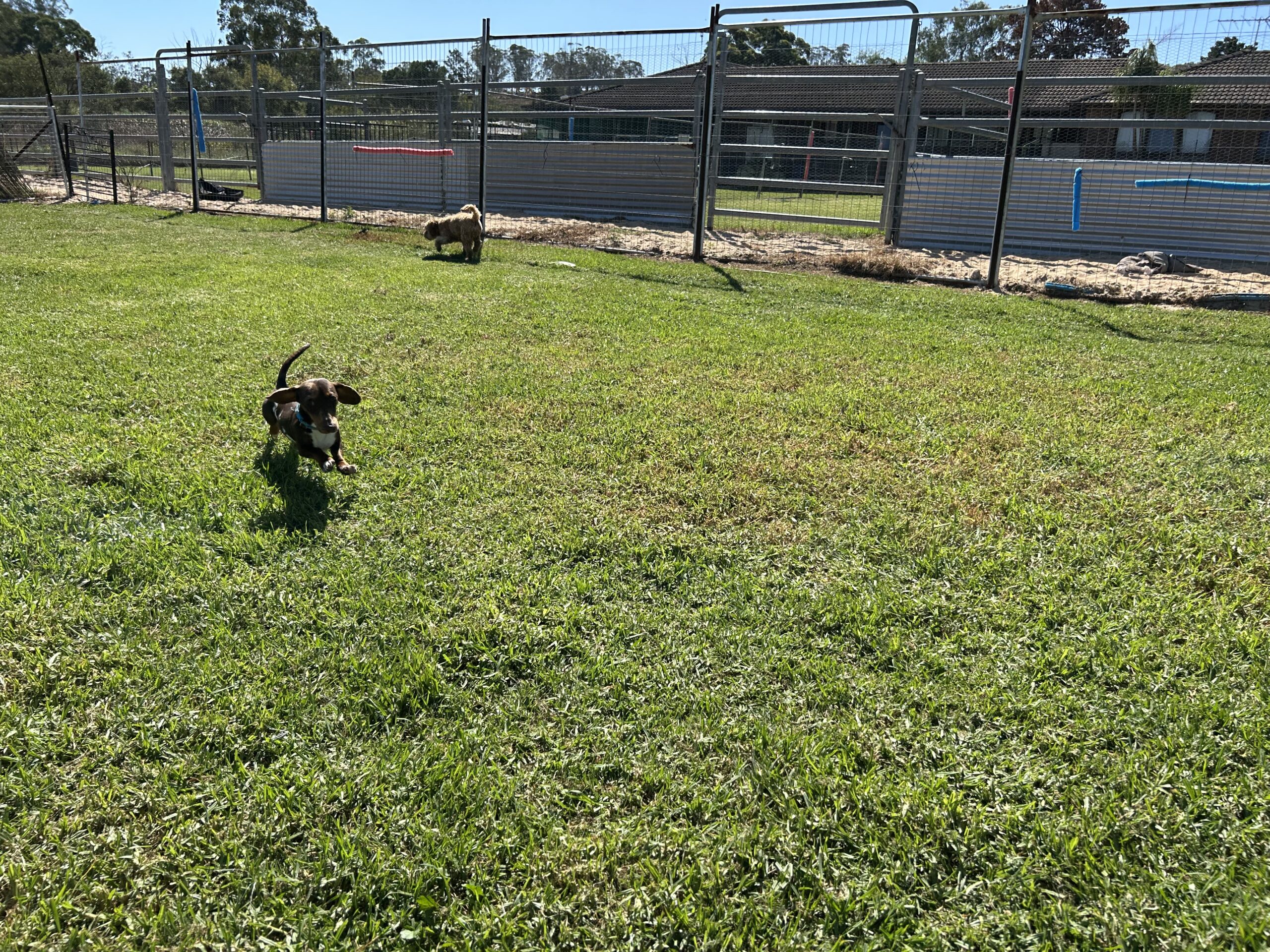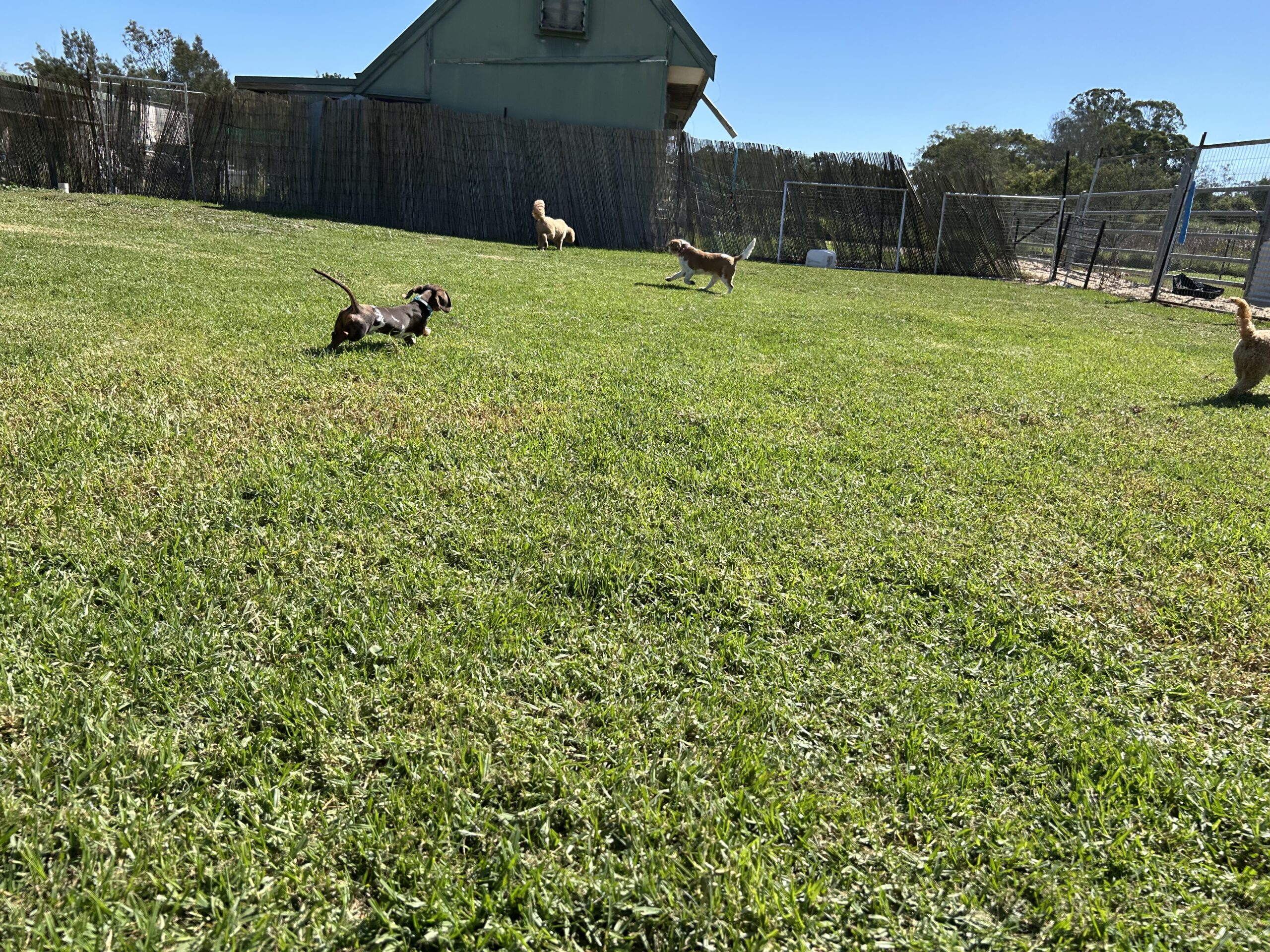Behavioural Benefits of Daycare: Peaceful Transformations Beyond Simple Socialisation
Behavioural benefits of daycare extend far beyond basic socialisation, creating comprehensive improvements in impulse control, emotional regulation, environmental adaptability, and communication skills that transform overall canine conduct.
Key Takeaways: Comprehensive Behavioural Improvements Through Daycare
| Essential Behavioural Transformations | Why It Matters |
|---|---|
| Behavioural benefits of daycare include enhanced impulse control | Self-regulation is the foundation of all good behaviour |
| Professional programmes develop emotional regulation abilities | Balance replaces reactivity across various situations |
| Environmental adaptability significantly improves | Dogs develop flexibility in new settings beyond the facility |
| Communication skills extend beyond basic social interaction | Clear signalling prevents misunderstandings with dogs and humans |
| Frustration tolerance builds through structured challenges | Dogs learn to manage disappointment without problematic reactions |
| Behavioural flexibility replaces rigid response patterns | Adaptable responses create resilience to changing circumstances |
| Professional assessment guides targeted improvement | Expert identification of behavioural needs creates efficient progress |
| Benefits generalise to home environments and behaviours | Improvements extend beyond the daycare setting to everyday life |
“The Comprehensive Transformation: Is Your Dog Missing Critical Behavioural Development Beyond Simple Play?”
Does your understanding of daycare benefits focus solely on socialisation and energy outlet, missing the profound behavioural development opportunities these environments can provide? Many devoted owners view daycare through an unnecessarily narrow lens, seeing it primarily as a place for dog-to-dog interaction rather than a comprehensive behavioural development setting that can transform fundamental conduct.
Research from veterinary behavioural science reveals that quality daycare environments provide far more than social exposure—they create systematic opportunities for developing crucial behavioural skills that form the foundation of well-adjusted canine conduct. Even more revealing, a groundbreaking study from the University of Melbourne found that dogs attending structured daycare programmes showed improvement across seven distinct behavioural domains, with effects extending far beyond simple social skills.
The implications extend beyond choosing quality daycare to fundamental developmental opportunities. According to certified animal behaviourists, the early years represent a critical period for establishing core behavioural competencies—capabilities that quality daycare can systematically develop through strategic programming. The good news? Comprehensive daycare programmes can provide systematic behavioural benefits that transform your dog’s conduct across multiple contexts.
Behavioural Benefits of Daycare Through Comprehensive Development
Behavioural benefits of daycare facilities operate on a fundamental developmental principle: quality programmes provide systematic opportunities for building core competencies that create well-adjusted behaviour across all environments. Unlike simple play facilities, quality behavioural benefits of daycare programmes implement sophisticated developmental protocols designed by canine behaviour specialists.
“Most owners dramatically underestimate the comprehensive behavioural development opportunities quality daycare provides,” explains Dr. Emma Richardson, veterinary behaviourist. “Effective programmes don’t just create socialised dogs—they develop impulse control, emotional regulation, communication skills, and environmental adaptability that transform overall conduct in all settings.”
Premier facilities delivering comprehensive behavioural benefits of daycare implement evidence-based strategies including:
- Systematic impulse control development through graduated challenges
- Emotional regulation training across varying arousal levels
- Communication skill development with both dogs and humans
- Environmental adaptability building through controlled novelty
- Frustration tolerance enhancement through appropriate boundary enforcement
- Behavioural flexibility development through varied scenarios
- Professional assessment identifying specific development needs
- Strategic intervention addressing individual behavioural gaps
These aren’t random experiences but carefully orchestrated developmental interventions designed by canine behaviour specialists. The comprehensive capabilities provided through behavioural benefits of daycare programmes create well-adjusted dogs whose improved conduct extends far beyond the facility itself.
Behavioural Benefits of Daycare: The Developmental Science of Comprehensive Improvement
Behavioural benefits of daycare programmes utilise cutting-edge understanding of canine development to create optimal skill building opportunities. Research from the University of Sydney’s Animal Behaviour Sciences department found that dogs attending structured daycare showed significantly improved behavioural regulation across multiple contexts compared to those receiving only home-based care, with improvements generalising to environments beyond the facility itself.
During professionally designed daycare experiences providing behavioural benefits of daycare, multiple developmental systems undergo sophisticated enhancement:
Impulse Control Development
Quality programmes provide graduated challenges requiring increasingly sophisticated self-regulation—building the fundamental capability underlying all good behaviour through systematic practice opportunities.
Emotional Regulation Enhancement
Structured exposures create opportunities to develop appropriate arousal management—teaching dogs to maintain balanced emotional states across varying situations through professional guidance.
Communication Skill Refinement
Facilitated interactions develop sophisticated signalling abilities—enhancing both dog-dog social learning and dog-human communication through clear feedback and guided practice.
Environmental Adaptability Building
Strategic introduction to novel elements builds flexibility—developing the confidence to navigate new situations through controlled exposure and success experiences.
“These behavioural benefits of daycare create fundamental improvements in core capabilities,” notes canine development specialist Dr. James Wilson. “In quality programmes, we’re not just providing play—we’re systematically developing the behavioural foundation that supports appropriate conduct across all contexts.”
Is Your Dog Receiving Comprehensive Behavioural Development? Take This Assessment:
- Does your dog’s daycare programme specifically target impulse control development?
- Are emotional regulation skills systematically enhanced through structured experiences?
- Does the programme provide professional guidance for communication skill development?
- Are environmental adaptability and novelty exposure strategically implemented?
- Does the facility document behavioural improvements across multiple domains?
If you answered “no” to two or more questions, your dog may be missing crucial developmental opportunities—precisely the comprehensive enhancement that specialised behavioural benefits of daycare programmes systematically provide.
Specialised Developmental Techniques at Quality Daycares
Premier behavioural benefits of daycare facilities implement evidence-based protocols designed by developmental specialists. These aren’t simple play programmes but sophisticated skill-building interventions created by canine behaviour professionals.
“The difference between basic playtime and comprehensive behavioural development is profound,” explains Dr. Sarah Williams, canine developmental psychologist. “Proper behavioural benefits of daycare programmes systematically build core competencies through strategic experiences that create genuine transformation across multiple behavioural domains.”
Leading behavioural benefits of daycare programmes feature developmental techniques such as:
Graduated Challenge Sequencing
Strategic progression of self-control challenges matched to individual capability—building impulse regulation through carefully calibrated experiences that create appropriate difficulty without overwhelming the dog’s current abilities.
Emotional Calibration Training
Structured activities developing appropriate arousal management—teaching dogs to maintain balanced emotional states even during exciting or challenging situations through guided regulation practice.
Communication Enhancement Exercises
Facilitated interactions focusing on clear signalling development—refining the subtle communication skills that prevent misunderstandings and conflict through professional feedback and guidance.
Environmental Confidence Building
Systematic exposure to novel elements within supportive contexts—developing adaptability to new situations through carefully managed experiences that build successful coping histories.
Case Study: Bailey’s Comprehensive Behavioural Transformation
Before: Bailey, a 2-year-old Labrador mix, displayed multiple behavioural challenges despite being generally friendly with other dogs. His family reported poor impulse control, overexcitement in novel environments, unclear communication with unfamiliar dogs leading to occasional misunderstandings, and difficulty settling after stimulation. Previous social-only daycare had improved his dog-dog interactions but hadn’t addressed these broader behavioural needs.
The Comprehensive Behavioural Benefits Programme: Bailey began attending a specialised behavioural benefits of daycare programme three days weekly. Staff conducted an initial assessment and created a personalised development protocol:
- Week 1: Comprehensive behavioural evaluation identifying specific developmental needs
- Weeks 2-4: Foundation impulse control development through graduated challenges
- Weeks 5-8: Emotional regulation training across varying arousal contexts
- Ongoing: Systematic development across all core behavioural domains
Measurable Results After Twelve Weeks:
- 78% improvement in impulse control during excitement
- Significant enhancement of emotional regulation after stimulation
- Clearly improved communication clarity with unfamiliar dogs
- Dramatically increased adaptability to novel environments
- Substantially reduced recovery time after arousing experiences
“The transformation in Bailey’s overall behaviour was remarkable,” reports his owner, Michael. “The behavioural benefits of daycare approach completely changed our experience. The staff didn’t just provide socialisation—they systematically developed core behavioural skills that transferred to all environments. His improved conduct at home, during walks, and in public settings demonstrated how comprehensive the benefits were beyond simple dog-dog interaction.”
Signs Your Dog is Receiving Comprehensive Behavioural Development
Not all dog daycare facilities provide genuine developmental benefits. Many focus solely on social play without addressing broader behavioural capabilities. To determine whether your behavioural benefits of daycare programme is providing true comprehensive development, monitor these evidence-based indicators:
- Your dog demonstrates improved impulse control across various situations
- Emotional regulation remains consistent even in exciting environments
- Your dog shows enhanced adaptability when facing novel situations
- Communication with both dogs and humans becomes clearer
- Arousal recovery occurs more quickly after stimulation
- Your dog displays appropriate frustration tolerance when denied access
- Behavioural improvements generalise to home and public environments
- Staff can articulate specific behavioural skills being developed
Dr. Thomas Chen, veterinary behaviourist, explains: “Effective behavioural benefits of daycare produce distinct developmental patterns that manifest as improved conduct across multiple contexts. When dogs receive proper comprehensive development, the transformation extends beyond simple socialisation—they develop fundamental behavioural competencies that support appropriate conduct in all environments.”
Behavioural Development Comparison: Social-Only vs. Comprehensive Programmes
| Developmental Need | Social-Only Approach | Comprehensive Behavioural Benefits |
|---|---|---|
| Impulse control development | Often incidental or overlooked | Systematic building through graduated challenges |
| Emotional regulation | Limited to dog-dog arousal management | Comprehensive training across varied contexts |
| Communication skills | Basic dog-dog interaction only | Sophisticated enhancement with dogs and humans |
| Environmental adaptability | Minimal novel exposure | Strategic introduction to varied environments |
| Frustration tolerance | Often undeveloped or inconsistent | Specific training through appropriate boundaries |
| Behavioural flexibility | Limited contextual experiences | Diverse scenarios building adaptive responses |
| Skill generalisation | Often facility-specific improvements | Capabilities transferring to all environments |
| Professional guidance | Typically focused on safety only | Expert development of specific behavioural domains |
Long-Term Benefits of Comprehensive Behavioural Development
Behavioural benefits of daycare programmes focused on comprehensive skill building offer enduring advantages that extend throughout your dog’s lifetime. Recent research from the University of Queensland’s Canine Behaviour Centre revealed that dogs receiving structured developmental programming showed significantly better behavioural stability across varying situations and maintained their improved conduct even years later.
“We now understand that appropriate early behavioural development creates lasting capabilities,” explains animal behaviourist Dr. Robert Thompson. “The comprehensive skills built through these programmes fundamentally enhance how dogs navigate their world, creating enduring behavioural competencies that support appropriate conduct throughout life.”
Evidence-based behavioural benefits of daycare include:
- Development of impulse control creating lifelong self-regulation
- Formation of emotional stability preventing reactivity
- Enhancement of clear communication preventing misunderstandings
- Building of environmental flexibility supporting adaptation to change
- Improvement in frustration tolerance preventing problem behaviours
- Creation of behavioural resilience supporting stability under stress
- Establishment of learning readiness enhancing future training
- Foundation of self-confidence enabling appropriate independence
These developmental benefits accumulate over time, with each behavioural benefits of daycare session contributing to your dog’s overall behavioural competence.
How Different Behavioural Domains Benefit from Comprehensive Daycare
Behavioural benefits of daycare programming recognises that different skill areas require specialised developmental approaches. Leading facilities implement tailored protocols for major behavioural domains:
Impulse Control Enhancement
The foundation of all good behaviour receives specialised behavioural benefits of daycare development through graduated challenge progression—building the self-regulation that prevents most problem behaviours through systematic practice opportunities.
Emotional Balance Development
Reactivity prevention benefits from comprehensive behavioural benefits of daycare approaches focusing on arousal management—teaching dogs to maintain appropriate emotional states even during stimulating or challenging circumstances.
Communication Clarity Building
Misunderstanding prevention requires specific behavioural benefits of daycare protocols developing nuanced signalling—enhancing the subtle communication skills that support harmonious interactions with both dogs and humans.
Novelty Confidence Creation
Environmental adaptability needs targeted behavioural benefits of daycare approaches introducing controlled novel experiences—building the flexibility that prevents fear-based responses to new situations through successful coping opportunities.
Comprehensive Daycare Evaluation Checklist
Not all facilities provide genuine behavioural development. Use this evidence-based checklist when evaluating potential behavioural benefits of daycare providers:
- Staff with specific training in canine behavioural development
- Individual assessment identifying developmental priorities
- Clear protocols for developing specific behavioural domains
- Systematic progression building skills through graduated challenges
- Professional monitoring of skill development across multiple areas
- Documentation of behavioural improvements in various contexts
- Strategic generalisation ensuring benefits transfer beyond the facility
- Regular communication regarding developmental progress
- Appropriate safety protocols throughout all activities
- Essential equipment designed for developmental programming
- Proper facility design supporting behavioural development
- Cleaning standards maintaining healthy environments
Critical Questions for Comprehensive Daycare Providers
When interviewing potential behavioural benefits of daycare facilities, ask these revealing questions to assess their developmental expertise:
- “How does your programme specifically develop impulse control beyond basic obedience?”
- “What techniques do you use to enhance emotional regulation capabilities?”
- “How do you build communication skills beyond basic dog-dog interaction?”
- “What systems do you have for developing environmental adaptability?”
- “How do you ensure behavioural improvements generalise to home environments?”
- “What credentials do your staff hold specifically related to behavioural development?”
- “How do you determine optimal scheduling for individual dogs?”
- “What nutrition considerations support behavioural development?”
- “How do you address illness prevention whilst maintaining developmental programming?”
The facility’s ability to provide substantive, detailed responses reveals their true commitment to comprehensive behavioural benefits of daycare versus facilities offering simple socialisation alone.
Special Considerations for Different Life Stages
Understanding how dog daycare frequency impacts different developmental stages is crucial for maximising behavioural benefits:
Puppy Development
Puppy daycare requirements differ significantly from adult programmes, requiring specialised approaches that support critical developmental periods whilst avoiding overwhelm.
Adult Dog Integration
Adult dogs benefit from structured socialisation opportunities that build upon existing behavioural foundations rather than starting from basic development.
Senior Dog Considerations
Mature dogs require modified approaches that accommodate physical limitations whilst still providing meaningful behavioural enrichment and social engagement opportunities.
Addressing Common Concerns and Misconceptions
Many owners hold misconceptions about daycare that prevent them from accessing comprehensive behavioural development opportunities. Understanding evidence-based benefits helps owners make informed decisions about their dog’s developmental needs.
For dogs with specific behavioural challenges, specialised programmes can address anxious behaviours through careful environmental management and gradual exposure protocols.
Building Confidence Through Developmental Programming
One of the most significant benefits of doggy daycare is the systematic development of self-confidence through structured success experiences.
Quality programmes create opportunities for dogs to:
- Practice decision-making in supportive environments
- Experience appropriate challenges that build resilience
- Develop problem-solving capabilities through guided exploration
- Build positive associations with novel experiences
- Strengthen appropriate response patterns through reinforcement
Conclusion: Transform Overall Conduct Through Comprehensive Development
Behavioural benefits of daycare programmes offer a sophisticated alternative to simple socialisation approaches that miss crucial developmental opportunities. By providing professionally designed skill building across multiple behavioural domains, these specialised programmes create well-adjusted dogs whose appropriate conduct extends far beyond simple social skills.
Each behavioural benefits of daycare session contributes to your dog’s comprehensive development. The cumulative effect builds a dog with balanced behaviour across all contexts—transforming not just social interaction but every aspect of their conduct.
“When we examine the developmental evidence,” notes Dr. Jessica Moore, veterinary behaviourist, “the conclusion is clear: comprehensive skill building through specialised behavioural benefits of daycare programmes represents one of the most valuable investments in your dog’s development, potentially preventing numerous problems while enhancing quality of life across all environments.”
Your dog deserves the comprehensive behavioural development that creates genuine competence rather than limited social skills alone. Schedule a developmental assessment today to discover how a quality behavioural benefits of daycare programme can transform your dog’s overall conduct through systematic skill building.
External Links:
- Canine Boarding Lodge
- Mobile Dog Grooming Services
- Canine Glamour Facebook
- Canine Glamour Instagram
- Canine Glamour TikTok
- Canine Boarding Lodge Facebook
Follow for more: For more grooming tips visit: FB: Canine glamour Instagram: Canine glamour TikTok: Canine Glamour For more boarding tips visit: FB: Canine boarding lodge





